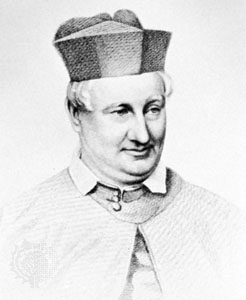If we are in earnest about our souls, with a quiet fidelity to those duties, practices and devotions, which obedience sanctions to us, our love of God increases without our knowing or feeling it. It is only now and then, in certain temptations, or on great feasts, or sometimes without apparent cause, that God allows us to perceive that we have really made some progress, and that we care more for Him and less for anything else but Him, than we used to do.
One sign to us of this increase of love is the growing sense of our own unworthiness and of the extreme littleness of everything we do. It becomes a pain to us that we have so little to offer to God, and that our service of Him is after all so wretched and ungenerous. The more we know Him, and the more we approach thoughts at least a little more worthy of His blessed Majesty, the more this feeling increases upon us, and, as I say, becomes a pain.
It is this which drives the Saints to yearn for suffering and to pray for crosses. The common cares, the ordinary weariness of life, are not enough to satisfy them, because they do not give them room for their heroic love. They want, a vain yet loving strife! to keep pace with the generosity of Jesus. Why should they do so little for Him? Why should they be thus imprisoned and kept in by the littleness of everything round about them? If sin was once a misery to them, now their inability to love God royally and magnificently, to spend themselves and to be spent for Him in glorious sacrifices—this has become a greater misery to them.
Like Areuna, they would give to their King as kings give, with full hands and prodigal expenditure. When God Himself gives them quiet times, and multiplies their joy and peace, they turn against Him, so to speak, with amorous complaint, “Nay, but I will buy it of thee at a price, and I will not offer to the Lord my God holocaust free-cost.” (2 Kgs. 24:24). Then they say strange things, that sound undoctrinal, about their being ready to endure all the pains of Hell to all eternity, if only they can thereby promote God’s glory one little degree; and they talk of disinterested love until they almost seem to incur the censures of condemned propositions.
These thoughts are not for us. They would be unreal in us. But we too, in our measure, feel this pain. We want to do more for Jesus, and our own cowardice when we come to the point is a keen misery and a sensible shame to us. And as we get to know Him and to love Him more, we want it to be our way also. And the little we can do seems so little, so very little!
Now, from what we know of Him we may be sure He would never leave us in this predicament. He desires nothing so much as our love; He would never leave us without adequate means of loving Him. Thus, also, does He come to the rescue of our love as well. He can do so in two ways. First of all, by giving to the littleness of our actions an immensity of value by uniting them to His own, and letting the worth of His own flow into them. Of this hereafter. Secondly, He can do so by treating us as He treated Mary, giving us Himself and all that belongs to Him to do with what we will, and to offer to God, as and when we please.
This article is taken from a chapter in All for Jesus: The Easy Ways to Divine Love by Fr. Frederick William Faber, which is available from TAN Books.








